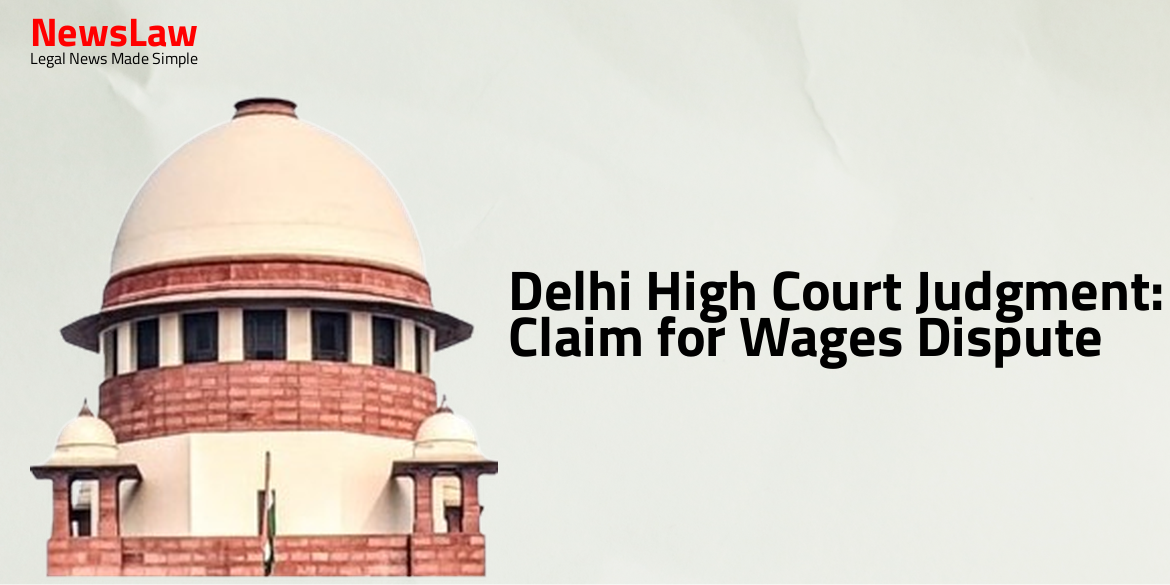Dive into the intricate world of tender disputes and judicial review with our latest case summary. This analysis sheds light on the court’s careful examination of tender documents and decision-making processes. Discover how legal principles shape the outcome of disputes in the realm of tender contracts, ensuring fair play and upholding the public interest.
Facts
- The appeals are related to a notice inviting tender (N.I.T.) issued by the State of Madhya Pradesh, Public Works Department (PWD) for the construction of an Elevated Corridor in Indore district.
- The construction project involves building a 7.473-kilometer elevated corridor from LIG Square to Navlakha Square.
- Bidders are required to demonstrate their experience in the construction of major bridges, ROBs, flyovers, or tunnels in the last five financial years prior to the bid due date.
- Specific experience requirements include completing at least one similar major bridge, ROB, flyover with a span equal to or greater than 50% of the proposed project’s longest span.
- For tunnel projects, bidders must have completed at least one tunnel with specific criteria related to cross-sectional area and length.
- Clause 2.2.2.5 outlines the categories and factors used to evaluate technical capacity of bidders.
- There was a difference of Rs. 9 crores between the financial bids of UPSBC and Rajkamal.
- UPSBC bid Rs. 306.27 crores while Rajkamal bid Rs. 315.80 crores.
- The State of Madhya Pradesh was directed to issue a letter of intent to UPSBC for Rs. 306.27 crores within 30 days.
- Rachana Construction Co. challenged the rejection of its technical bid, which was upheld based on specific clause requirements.
- UPSBC’s bid was not disqualified despite an FIR against them, as there was no pending investigation as per clause 7(b) of Annex I.
- Rachana Construction Co.’s bid for Rs. 293.25 crores was not under consideration due to disqualification.
Also Read: Legal Analysis on Physical Ability in Rape Case
Arguments
- The petitioner argued that they had the necessary experience for the project based on previous similar works completed.
- The petitioner’s financial bid was Rs. 9 crores less than the competitor, Rajkamal.
- The authorities were criticized for splitting the project awarded under one tender into two.
- Arguments were made regarding the interpretation of ‘investigation pending’ and ‘fraudulent practice’ clauses.
- Legal precedents were cited to support the petitioner’s position, emphasizing compliance with tender formats and rules of interpretation.
- The Evaluation Committee declared the petitioner as non-responsive due to cost considerations.
- The petitioner’s non-responsiveness led to the financial bid and quoted rates being deemed immaterial.
- Allegations were made against Rachana Construction Co. for not intervening or filing a writ petition in a timely manner.
- Concerns were raised about the grounds on which UPSBC’s bid was rejected, limiting the issues that could be raised in the case.
- Shri Puneet Jain, representing Rajkamal, criticized the judgment in UPSBC’s case and supported Rachana Construction Co.’s case.
- He pointed out that Appendix IA was not properly interpreted, specifically mentioning paragraphs 11 and 13 should be read together.
- Paragraph 11 highlighted that UPSBC’s involvement in a criminal case could lead to rejection of its bid.
- For Rachana Construction Co., he emphasized on clause 2.2.2.2(ii) which required additional experience in similar bridge projects.
- Rachana Construction Co. fell short of the required experience, having constructed two road over bridges totaling 2380 meters, far below the minimum of 3.736 kilometers needed.
Also Read: Analysis of Transfer of Winding Up Proceedings to NCLT
Analysis
- The Authority reserves the right to reject any non-responsive Technical BID.
- Bidders and their representatives must maintain the highest standards of ethics during the Bidding Process and Agreement.
- The Appendix-IA letter format must be followed for the Technical BID submission.
- Certification is required regarding the absence of convictions or adverse orders that may cast doubt on the ability to undertake the Project.
- Experience across different categories is computed based on specified factors.
- Authority can reject a bid if a material misrepresentation is made at any time.
- Evaluation of Technical BIDs includes tests of responsiveness as outlined in clauses 3.1.6.1 and 3.1.6.2.
- Corrupt practices during the Bidding Process can lead to rejection of the bid and forfeiture of the security.
- Fraudulent practice is defined as misrepresentation or suppression of facts to influence the Bidding Process.
- Detailed instructions and formats are provided for bidding in the N.I.T.
- The judgment discusses the issue of non-disclosure of the show-cause notice, which led to the disqualification of the appellant in a tender process.
- The importance of disclosing if a bidder has been banned by government or quasi-government agencies is emphasized.
- The appellant’s bid was rejected based on the suppression of material facts related to an FIR against them.
- The judgment highlights the need for strict compliance with the tender format and the consequences of non-disclosure.
- The concept of ‘fraudulent practice’ includes omitting relevant facts to influence the bidding process.
- The courts must respect the understanding of tender documents unless there are mala fide intentions or misinterpretations.
- The issue of the effect of blacklisting or holiday listing on a bidder’s eligibility is addressed.
- The necessity of proper format in disclosing information related to blacklisting or similar actions is discussed.
- The case involves the rejection of a bid due to lack of valid ISO certification for security and business continuity.
- The controversy surrounding the business continuity clause and the submission of ISO certificates is explained.
- A specific instance is mentioned where a bid was considered non-responsive due to failure in fulfilling criteria outlined in the tender document.
- The modern trend points to judicial restraint in administrative action.
- The court does not sit as a court of appeal but merely reviews the manner in which the decision was made.
- The court does not have the expertise to correct the administrative decision.
- The decision must not only be tested by the application of Wednesbury principle of reasonableness but must be free from arbitrariness not affected by bias or actuated by mala fides.
- Quashing decisions may impose heavy administrative burden on the administration and lead to increased and unbudgeted expenditure.
- The soundness of the decision made by the employer should generally not be questioned, but the decision-making process can be subject to judicial review if it is irrational, mala fide, or intended to favor someone.
- Terms of the invitation to tender cannot be open to judicial scrutiny as it falls within the realm of contract.
- Judicial review should not be invoked to protect private interest over public interest or to decide contractual disputes.
- Special considerations should be taken into account when invoking judicial review in matters relating to tenders or contract awards.
- The employer’s interpretation of the tender documents should be respected, as they are best positioned to understand and interpret the requirements.
- Interference in tender or contractual matters through judicial review should be based on specific criteria like mala fides, arbitrariness, irrationality, and impact on public interest.
- The employer has the authority to deviate from essential terms, as long as the deviation is applied uniformly to all bidders.
- Judicial restraint should be exercised in interfering with administrative actions related to tenders.
- A fair play in the joints is necessary for administrative bodies functioning in administrative or quasi-administrative spheres.
- The expression ‘at least one similar work’ could possibly mean the construction of only one such bridge and not two under the same tender document.
- The construction of the clause by the tendering authority cannot be considered impossible or perverse.
- Shri Puneet Jain’s argument, though raised for the first time, supports the State of Madhya Pradesh as the two road over bridges constructed under the agreement have a combined span of 2380 meters, which is less than 50% of 7.473 kilometers.
Also Read: Judicial Discretion in Contractual Interpretation
Decision
- Rachana Construction Co.’s SLP is dismissed and the judgment dated 02.07.2020 and the review judgment dated 04.08.2020 are upheld.
- The State of Madhya Pradesh is directed to issue a LOI to Rajkamal at the same financial bid as UPSBC for the present tender.
- All appeals are disposed of accordingly.
Case Title: THE STATE OF MADHYA PRADESH Vs. U.P. STATE BRIDGE CORPORATION LIMITED (2020 INSC 686)
Case Number: C.A. No.-004002-004002 / 2020



